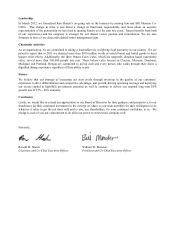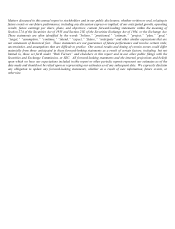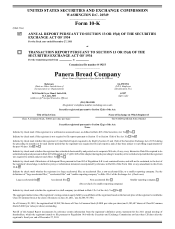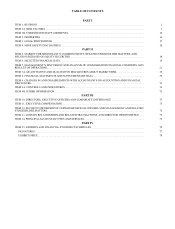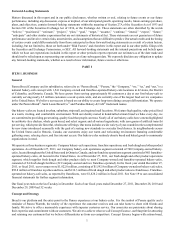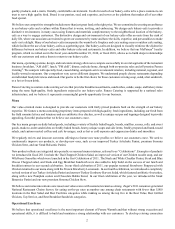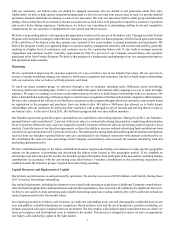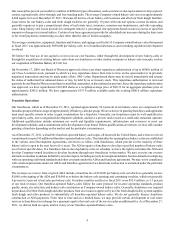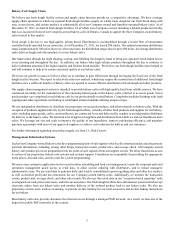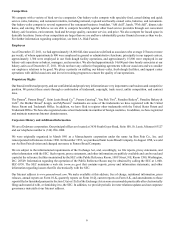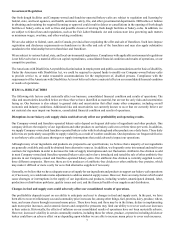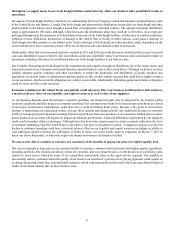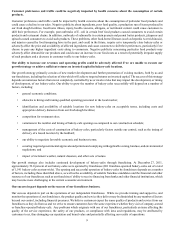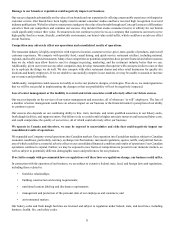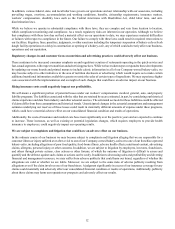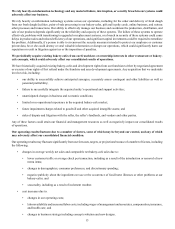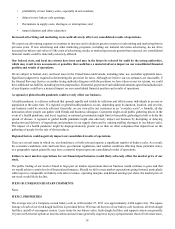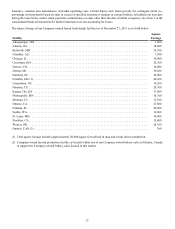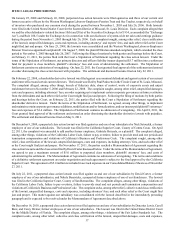Panera Bread 2011 Annual Report Download - page 15
Download and view the complete annual report
Please find page 15 of the 2011 Panera Bread annual report below. You can navigate through the pages in the report by either clicking on the pages listed below, or by using the keyword search tool below to find specific information within the annual report.7
Government Regulation
Our fresh dough facilities and Company-owned and franchise-operated bakery-cafes are subject to regulation and licensing by
federal, state, and local agencies, and health, sanitation, safety, fire, and other governmental departments. Difficulties or failures
in obtaining and retaining the required licensing or approval could result in delays or cancellations in the opening of fresh dough
facilities or bakery-cafes as well as fines and possible closure of existing fresh dough facilities or bakery-cafes. In addition, we
are subject to federal laws and regulations, such as the Fair Labor Standards Act and various state laws governing such matters
as minimum wages, overtime, and other working conditions.
We are also subject to federal, state, and in Canada, provincial laws regulating the offer and sale of franchises. Such laws impose
registration and disclosure requirements on franchisors in the offer and sale of the franchises and may also apply substantive
standards to the relationship between franchisor and franchisee.
We are subject to various federal, state, and local environmental regulations. Compliance with applicable environmental regulations
is not believed to have a material effect on capital expenditures, consolidated financial condition and results of operations, or our
competitive position.
The Americans with Disabilities Act prohibits discrimination in employment and public accommodations on the basis of disability.
Under the Americans with Disabilities Act, we could be required to expend funds to modify our Company-owned bakery-cafes
to provide service to, or make reasonable accommodations for the employment of, disabled persons. Compliance with the
requirements of the Americans with Disabilities Act is not believed to have a material effect on our consolidated financial condition
or results of operations.
ITEM 1A. RISK FACTORS
The following risk factors could materially affect our business, consolidated financial condition and results of operations. The
risks and uncertainties described below are those that we have identified as material, but are not the only risks and uncertainties
facing us. Our business is also subject to general risks and uncertainties that affect many other companies, including overall
economic and industry conditions. Additional risks and uncertainties not currently known to us or that we currently believe are
not material also may impair our business, consolidated financial condition and results of operations.
Disruptions in our bakery-cafe supply chain could adversely affect our profitability and operating results.
Our Company-owned and franchise-operated bakery-cafes depend on frequent deliveries of ingredients and other products. One
company delivers the majority of our ingredients and other products to our bakery-cafes two or three times per week. In addition,
we supply Company-owned and franchise-operated bakery-cafes with fresh dough and other products on a daily basis. These daily
deliveries are particularly susceptible to supply volatility as a result of weather conditions. Our dependence on frequent deliveries
to our bakery-cafes could cause shortages or supply interruptions that could adversely impact our operations.
Although many of our ingredients and products are prepared to our specifications, we believe that a majority of our ingredients
are generally available and could be obtained from alternative sources. In addition, we frequently enter into annual and multi-year
contracts for ingredients in order to decrease the risks of supply interruptions and cost fluctuation. Antibiotic-free chicken is sold
in most Company-owned and franchise-operated bakery-cafes and we have introduced and tested the sale of other antibiotic-free
proteins in our Company-owned and franchise-operated bakery-cafes. Our antibiotic-free chicken is currently supplied to us by
three different companies. However, there are few producers of antibiotic-free chicken or other antibiotic-free proteins, which
may make it difficult or more costly for us to find alternative suppliers if necessary.
Generally, we believe that we have adequate sources of supply for our ingredients and products to support our bakery-cafe operations
or, if necessary, we could make menu adjustments to address material supply issues. However, there are many factors which could
cause shortages or interruptions in the supply of our ingredients and products, including weather, unanticipated demand, labor,
production or distribution problems, quality issues and cost, and the financial health of our suppliers and distributors.
Changes in food and supply costs could adversely affect our consolidated results of operations.
Our profitability depends in part on our ability to anticipate and react to changes in food and supply costs. In the past, we have
been able to recover inflationary cost and commodity price increases for, among other things, fuel, proteins, dairy, produce, wheat,
tuna, and cream cheese through increased menu prices. There have been, and there may be in the future, delays in implementing
such menu price increases, and economic factors and competitive pressures may limit our ability to recover such cost increases
in their entirety. Historically, the effects of inflation on our consolidated results of operations have not been materially adverse.
However, increased volatility in certain commodity markets, including those for wheat, produce, or proteins including chicken or
turkey could have an adverse effect on us depending upon whether we are able to increase menu prices to cover such increases.


